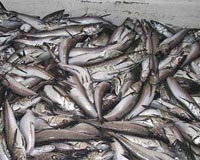 |
Madrid, Spain (SPX) May 24, 2010 In the 1990s the European Commission approved a series of management measures to avoid the over-exploitation of fishery resources. A study carried out by the University of Santiago de Compostela (USC) now reveals that the Common Fisheries Policy in Europe has promoted the extension of the European fleet into more vulnerable eco-systems such as deep waters. However, the next reform of the fishery policy could reverse this trend and achieve sustainability of marine resources. "The regulation of fishery resources and of the Community fleet has not achieved the expected results", confirm two Spanish research projects which appear in the latest edition of the Marine Policy magazine and which provide an update on all the information available regarding European fishery resources. "The Common Fisheries Policy has drastically reduced small-scale fishing in the main European coastal towns, and has subsidised the increase of larger fleets that fish in community waters, and in third countries, but above all in fishing grounds in waters more than 400 metres deep", Sebasti�n Villasante reports to SINC. He is the author of the studies, which are the product of a doctoral thesis led by Mar�a do Carme Garc�a-Negro, head of the Fishery Economy and Natural Resources Research Group in the USC. Only a limited number of the community fishing ground stocks will have been recouped in 2015. "The rest is in a situation of over-exploitation and decline", states the fishery economy expert. The laxness of the controls, the technological advances in vessels, and "the reluctant will of the member states to reduce their fishing capacity" are some of the reasons why the common policy has not been effective. "This has created a very delicate situation both in terms of the marine eco-systems and the fishing industry itself", Villasante points out. "Non-cooperative management, the high volume of waste and illegal fishing, the "bad" subsidies assigned to the industry by the governments, the quest for short-term financial profit, and the ineffective forms of governing" the sea can all be added to the list of problems, according to the researcher.
A threat to marine biodiversity Villasante believes that with the increasing demand from the community market, the Common Fisheries Policy "has not been able to reduce the importation of fish products from developing countries, and the food safety of coastal towns in Africa, Asia and South America has also been put at risk". "We are witnessing an era of financial globalisation of the fishing industry, but also a globalisation of the effects on oceans and coastal towns. In view of this, an overall response is also necessary from the scientific community and the governments", specifies the scientist.
More marine reserves and new regulations "Mechanisms needed by experts, industry and governments for discussing and exchanging opinions are being created, although these results are not binding for the purpose of the next reform of the Common Fisheries Policy", warns the researcher, who considers that the next reform arises as "an excellent opportunity, although somewhat late since the EU will not carry out the international agreements made in the Johannesburg Summit for 2015". The focus of the next reform of the Common Fisheries Policy will be to create more marine reserves, and "to adopt new mechanisms for the distribution of fishing resources that will guarantee that stocks will be recouped and jobs maintained, as well as to establish incentive measures for fishermen and women so that they take part in the decision-making process", states the expert. In order to achieve sustainable fishing, Villasante proposes new biological, ecological and economic goals for 2020. "We need to eliminate the subsidies that encourage overfishing, create mechanisms to protect small-scale fishing, create protected marine areas according to the intensity of the fishing and the vulnerability of the species, and adopt a regime to sanction non-sustainable fishing practices", the researcher concludes.
Share This Article With Planet Earth
Related Links FECYT - Spanish Foundation for Science and Technology Farming Today - Suppliers and Technology
 Argentina risks losing hake export market
Argentina risks losing hake export marketBuenos Aires (UPI) May 20, 2010 Argentina risks losing about half its export market for hake because of crisis conditions in the fishing industry caused by overfishing, low yields and tougher EU rules. This week the government imposed what it called a "biological shutdown" - preventing fishing crews from leaving the ports. Analysts said the ban would be difficult to implement over the long term, amid signs tha ... read more |
|
| The content herein, unless otherwise known to be public domain, are Copyright 1995-2010 - SpaceDaily. AFP and UPI Wire Stories are copyright Agence France-Presse and United Press International. ESA Portal Reports are copyright European Space Agency. All NASA sourced material is public domain. Additional copyrights may apply in whole or part to other bona fide parties. Advertising does not imply endorsement,agreement or approval of any opinions, statements or information provided by SpaceDaily on any Web page published or hosted by SpaceDaily. Privacy Statement |